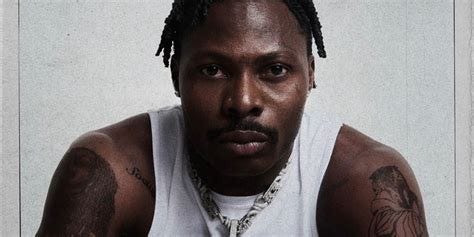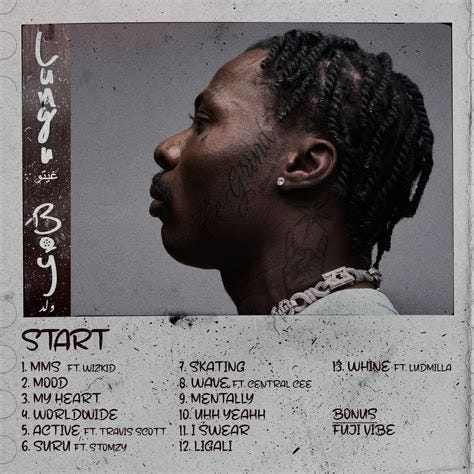Halfway into his third LP, Asake effusively sings, “Skating issa part of me, part of me/Skating issa lifestyle/Skating, skating, skating”. It is a telling moment, this weird hook bouncing on the tentative P.Prime beat. It is a sharp detour from Asake’s biography as we know it. One wonders where the skating rink in the Lungu was located. And if my memory of the OAU campus still serves me, the uncovered pavilion was not repurposed for skating–and even if it was, there is the risk of bumping into Pentecostal prayer warriors, eyes shut, jaw slackening out glossolalia. But an outsized meteoric rise is deserving of a similarly outsized lifestyle reconfiguration. ‘Skating’, easily the weakest track on this slightly underwhelming record, provides us with the coordinates of Asake’s career: he is in a skating rink, ostensibly decelerating.
Thankfully, it gets better, but it never meets Work of Art’s ambition, cohesion, and emotional resonance. If Work is covertly self-reflective, Lungu Boy is overtly self-referential. Lungu reappears in the Black Diaspora pop culture’s lexicon as a synonym for ghetto (it is used to identify two Bantu ethnic groups). Asake signals that he may have emerged from the ghetto, but now skating is a lifestyle, a part of him. He is so giddy about this newfound plaything that he makes a praise song. What is bad is that it appears on this record. Who is this song for? Rollerblade skaters in ice rinks are used to Discothèque music. Diehard Asake fans (my leader!) are used to clever wordplay, rampant melody and exquisite penmanship. Well, this song is for Asake, who has torn himself a new sobriquet, Lungu Boy. Formerly known as Lungu Boy may be a more fitting title, given that there are no skating rinks in the Lungu.
Asake cuts the persona of John Updike’s Rabbit, the American Everyman of a certain era, who became rich. For some, getting rich means buying a Mercedes, an exclusive club membership (with a bespoke blazer), a trophy wife, premium liquor. For Asake, skating it is. And as with all pleasures, skating, especially in the Lungu, comes with risks. You may run into members of the prayer group of the Word Ablaze campus fellowship or a commuter crowd in New York City. Worse, you may trip from the Lungu’s uneven surface. You may fall. What is certain is that skating in the Lungu will cost your balance, and this much is clear on this record: the struggle for balance.
A West-facing (read America) album was only a matter of time for Asake. With global superstars like Travis Scott, Stormzy and Central Cee, Lungu Boy is punching. But it is underserved by the it factor. For the Asake stans, the diagnosis is easy to clinch: this music is facing out; Asake’s superpower is his interiority. Also, the subject matter, the miraculous meteoric rise to the top, is no longer novel or pursued in novel ways. There are no smooth detours. No elegant turns of phrase; Asake’s penmanship is easily at its weakest, and the album credits tell why: Olamide is missing.
It gets worse. Lungu Boy hardly rewards further replays. The record’s gems– ‘Active’ and ‘Fuji Vibe’–are few and far between. On the more introspective records, the songwriting is hackneyed. It may be too early to call, but the anecdote of Gordon Lish and Raymond Carver comes to mind. For the uninitiated, Lish was Carver’s editor. A colossus of a man in his own right, it was rumoured that Lish’s radical editing gave Carver his style. Following the death of Carver, his widow demystified his legacy by publishing his original drafts. She butchered the alchemy, the it.
The hit of this album is the Sarz-produced Travis-Scott-assisted behemoth, ‘Active’. Interpolating Adewale Ayuba’s tinny tenor on Jazzman Olofin’s ‘Raise the Roof’(produced by the late OJB Jezreel) with highly percussive early Hip-Hop was a dual tribute to Fuji and Hip-Hop genres. The effect is sleek and Asake is smooth af. The other wonder is the album’s sebene, ‘Fuji Vibe’, whose snippet has been doing our heads in since it premiered on social media. We begged for a release date and, finally, it is here. But there is no incandescent segue like how ‘Great Guy’ bleeds into ‘Yoga’ in Work of Art. It hardly matters because it all ends with dance.






Maybe he’s channeling the skaters that weave in and out of traffic on Lagos roads. I’ve heard it’s quite the past time for some Nigerian youth, apart from it being a means of employment for some.
Dami! You always leave me in awe with your writing! Just wanted to put this out.